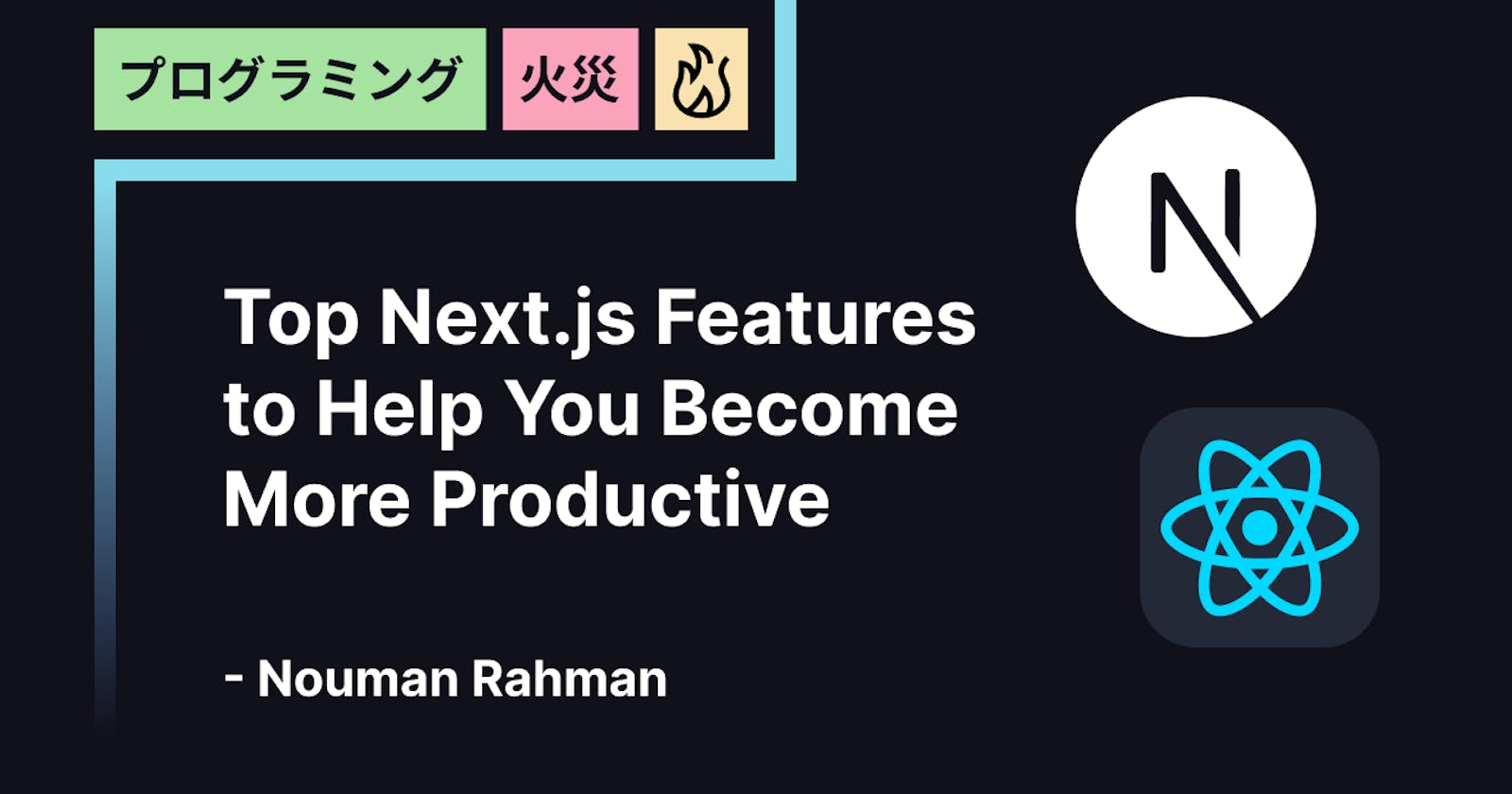Introduction
Next.js has gained tremendous popularity as a powerful and versatile framework for building modern web applications with React. It comes packed with an array of features that not only streamline the development process but also boost productivity significantly. In this article, we'll take a detailed look at the top Next.js features that make it a go-to choice for developers and help them become more productive in their web development endeavors.
1. Incremental Static Regeneration (ISR)
Next.js takes static site generation to the next level with Incremental Static Regeneration (ISR). This feature allows you to update static pages at regular intervals without rebuilding the entire site. It's particularly useful for dynamic content that changes frequently but doesn't require real-time updates.
// pages/blog/[slug].tsx
import { GetStaticPaths, GetStaticProps } from 'next';
interface Post {
title: string;
content: string;
}
interface BlogPostProps {
post: Post;
}
const BlogPost: React.FC<BlogPostProps> = ({ post }) => {
return (
<div>
<h1>{post.title}</h1>
<p>{post.content}</p>
</div>
);
};
export const getStaticProps: GetStaticProps<BlogPostProps> = async ({ params }) => {
const res = await fetch(`https://api.example.com/posts/${params?.slug}`);
const post = await res.json();
return {
props: { post },
revalidate: 60, // Revalidate the page every 60 seconds
};
};
export const getStaticPaths: GetStaticPaths = async () => {
// Fetch all slugs from the API to generate static paths
const res = await fetch('https://api.example.com/posts');
const posts = await res.json();
const paths = posts.map((post: { slug: string }) => ({ params: { slug: post.slug } }));
return {
paths,
fallback: true, // Show fallback page while generating new static page
};
};
export default BlogPost;
2. Next.js API Middlewares
Next.js allows you to use custom API middlewares to enhance the functionality of your API routes. Middlewares can be used to handle authentication, logging, data parsing, and other common tasks before reaching the actual API endpoint. This promotes clean and reusable code, making it easier to manage complex API logic.
// pages/api/middleware.ts
import { NextApiHandler } from 'next';
const middleware = (handler: NextApiHandler): NextApiHandler => (req, res) => {
// Perform some tasks before reaching the API route
console.log('Middleware executed!');
return handler(req, res);
};
export default middleware;
3. Built-in CSS Support
Next.js provides built-in support for CSS modules, CSS-in-JS, and global CSS styles. You can easily import CSS files directly into your components, and Next.js will handle the rest. This allows for better component isolation and easy styling, reducing the chances of style conflicts and improving the maintainability of your stylesheets.
// components/Button.module.css
.button {
background: red;
}
// components/Button.tsx
import styles from './Button.module.css';
const Button: React.FC = ({ children }) => {
return <button className={styles.button}>{children}</button>;
};
export default Button;
4. Image Optimization
Next.js optimizes images automatically to improve performance. It supports lazy loading and image formats like WebP to reduce page load times. You can import images directly into your components, and Next.js will optimize and serve them based on the device's screen size. This ensures that your images are delivered efficiently, leading to a better user experience and faster page loads.
// components/Avatar.tsx
import Image from 'next/image';
const Avatar: React.FC = () => {
return <Image src="/avatar.jpg" alt="User Avatar" width={100} height={100} />;
};
export default Avatar;
5. API Routes with Middleware
Next.js API routes also support middlewares, allowing you to apply common functionality to multiple API endpoints. This simplifies the codebase and improves code reusability. Middleware functions can handle tasks like authentication checks, request logging, error handling, and more, allowing for cleaner and more organized code.
// pages/api/user.ts
import { NextApiHandler } from 'next';
import middleware from './middleware';
const getUser: NextApiHandler = (req, res) => {
const user = { name: 'John Doe', email: 'john@example.com' };
res.status(200).json(user);
};
export default middleware(getUser);
6. Internationalization (i18n)
Next.js has built-in support for internationalization, making it easier to create multilingual websites. It provides tools and components that help you manage different translations and localized content. With i18n support, you can easily reach a global audience and offer content tailored to the user's preferred language.
// pages/index.tsx
import { useRouter } from 'next/router';
const HomePage: React.FC = () => {
const router = useRouter();
const handleClick = (locale: string) => {
router.push(router.pathname, router.asPath, { locale });
};
return (
<div>
<h1>Welcome to my website</h1>
<button onClick={() => handleClick('en')}>English</button>
<button onClick={() => handleClick('fr')}>French</button>
</div>
);
};
export default HomePage;
7. Code Splitting with Dynamic Imports
Next.js offers seamless code splitting with dynamic imports, allowing you to load only the necessary JavaScript and CSS for each page. This leads to faster initial page loads and improved performance. By leveraging dynamic imports, you can optimize your application's bundle size and load only the code required for the current user flow.
// pages/about.tsx
import dynamic from 'next/dynamic';
const DynamicComponent = dynamic(() => import('../components/DynamicComponent'));
const AboutPage: React.FC = () => {
return (
<div>
<h1>About Us</h1>
<DynamicComponent />
</div>
);
};
export default AboutPage;
Conclusion
Next.js provides an extensive set of features that cater to developers' needs, allowing them to build modern and performant web applications with ease. From Incremental Static Regeneration and API middlewares to built-in CSS support and image optimization, Next.js simplifies complex tasks and boosts productivity.
In this article, we explored some advanced features alongside the standard productivity-enhancing ones. Next.js empowers developers to create cutting-edge applications and easily manage complexities, resulting in efficient and maintainable codebases.
So, if you're ready to take your web development skills to the next level and create exceptional web applications, Next.js is the framework to consider. Embrace its features, experiment with advanced functionalities, and unlock a world of possibilities for your web development projects. Happy coding!
